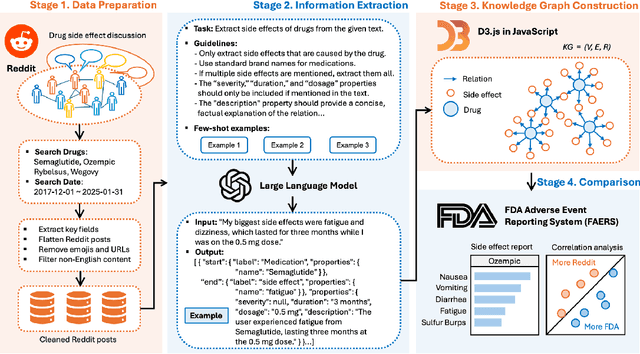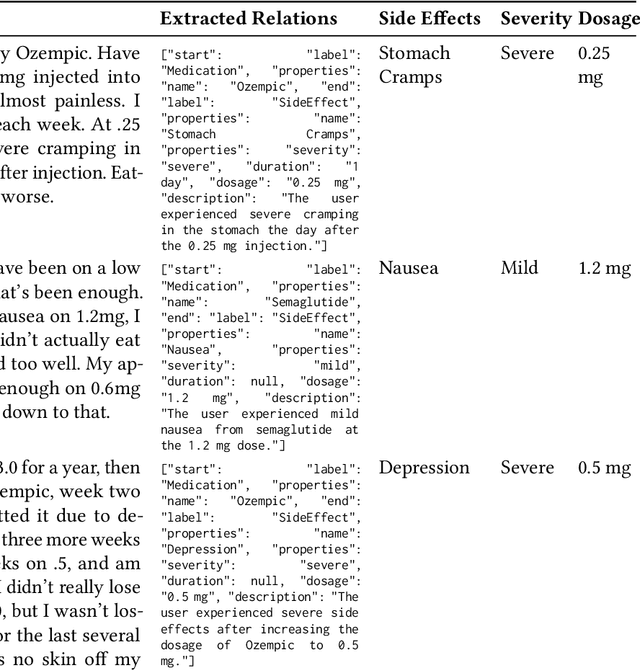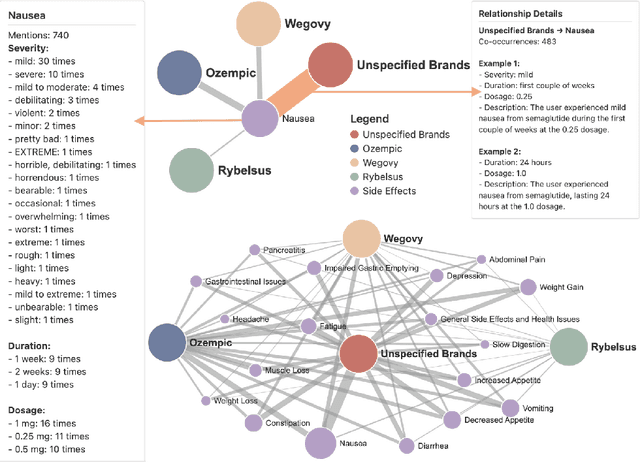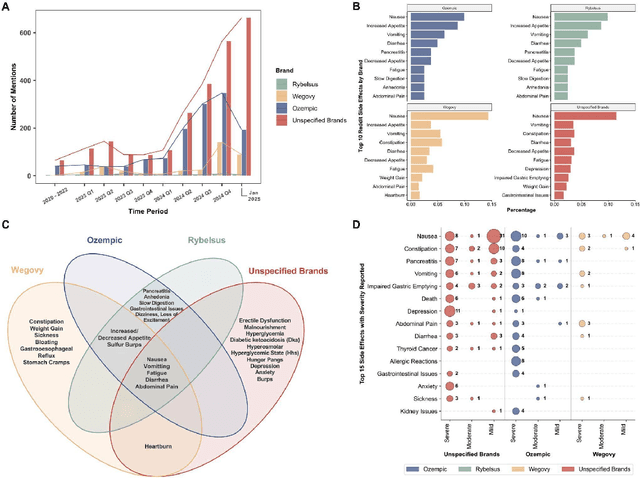Zhaoqian Xue
Crowdsourcing-Based Knowledge Graph Construction for Drug Side Effects Using Large Language Models with an Application on Semaglutide
Apr 08, 2025



Abstract:Social media is a rich source of real-world data that captures valuable patient experience information for pharmacovigilance. However, mining data from unstructured and noisy social media content remains a challenging task. We present a systematic framework that leverages large language models (LLMs) to extract medication side effects from social media and organize them into a knowledge graph (KG). We apply this framework to semaglutide for weight loss using data from Reddit. Using the constructed knowledge graph, we perform comprehensive analyses to investigate reported side effects across different semaglutide brands over time. These findings are further validated through comparison with adverse events reported in the FAERS database, providing important patient-centered insights into semaglutide's side effects that complement its safety profile and current knowledge base of semaglutide for both healthcare professionals and patients. Our work demonstrates the feasibility of using LLMs to transform social media data into structured KGs for pharmacovigilance.
Patients Speak, AI Listens: LLM-based Analysis of Online Reviews Uncovers Key Drivers for Urgent Care Satisfaction
Mar 26, 2025Abstract:Investigating the public experience of urgent care facilities is essential for promoting community healthcare development. Traditional survey methods often fall short due to limited scope, time, and spatial coverage. Crowdsourcing through online reviews or social media offers a valuable approach to gaining such insights. With recent advancements in large language models (LLMs), extracting nuanced perceptions from reviews has become feasible. This study collects Google Maps reviews across the DMV and Florida areas and conducts prompt engineering with the GPT model to analyze the aspect-based sentiment of urgent care. We first analyze the geospatial patterns of various aspects, including interpersonal factors, operational efficiency, technical quality, finances, and facilities. Next, we determine Census Block Group(CBG)-level characteristics underpinning differences in public perception, including population density, median income, GINI Index, rent-to-income ratio, household below poverty rate, no insurance rate, and unemployment rate. Our results show that interpersonal factors and operational efficiency emerge as the strongest determinants of patient satisfaction in urgent care, while technical quality, finances, and facilities show no significant independent effects when adjusted for in multivariate models. Among socioeconomic and demographic factors, only population density demonstrates a significant but modest association with patient ratings, while the remaining factors exhibit no significant correlations. Overall, this study highlights the potential of crowdsourcing to uncover the key factors that matter to residents and provide valuable insights for stakeholders to improve public satisfaction with urgent care.
Sympathy over Polarization: A Computational Discourse Analysis of Social Media Posts about the July 2024 Trump Assassination Attempt
Jan 17, 2025



Abstract:On July 13, 2024, at the Trump rally in Pennsylvania, someone attempted to assassinate Republican Presidential Candidate Donald Trump. This attempt sparked a large-scale discussion on social media. We collected posts from X (formerly known as Twitter) one week before and after the assassination attempt and aimed to model the short-term effects of such a ``shock'' on public opinions and discussion topics. Specifically, our study addresses three key questions: first, we investigate how public sentiment toward Donald Trump shifts over time and across regions (RQ1) and examine whether the assassination attempt itself significantly affects public attitudes, independent of the existing political alignments (RQ2). Finally, we explore the major themes in online conversations before and after the crisis, illustrating how discussion topics evolved in response to this politically charged event (RQ3). By integrating large language model-based sentiment analysis, difference-in-differences modeling, and topic modeling techniques, we find that following the attempt the public response was broadly sympathetic to Trump rather than polarizing, despite baseline ideological and regional disparities.
What if LLMs Have Different World Views: Simulating Alien Civilizations with LLM-based Agents
Feb 21, 2024



Abstract:In this study, we introduce "CosmoAgent," an innovative artificial intelligence framework utilizing Large Language Models (LLMs) to simulate complex interactions between human and extraterrestrial civilizations, with a special emphasis on Stephen Hawking's cautionary advice about not sending radio signals haphazardly into the universe. The goal is to assess the feasibility of peaceful coexistence while considering potential risks that could threaten well-intentioned civilizations. Employing mathematical models and state transition matrices, our approach quantitatively evaluates the development trajectories of civilizations, offering insights into future decision-making at critical points of growth and saturation. Furthermore, the paper acknowledges the vast diversity in potential living conditions across the universe, which could foster unique cosmologies, ethical codes, and worldviews among various civilizations. Recognizing the Earth-centric bias inherent in current LLM designs, we propose the novel concept of using LLMs with diverse ethical paradigms and simulating interactions between entities with distinct moral principles. This innovative research provides a new way to understand complex inter-civilizational dynamics, expanding our perspective while pioneering novel strategies for conflict resolution, crucial for preventing interstellar conflicts. We have also released the code and datasets to enable further academic investigation into this interesting area of research. The code is available at https://github.com/agiresearch/AlienAgent.
 Add to Chrome
Add to Chrome Add to Firefox
Add to Firefox Add to Edge
Add to Edge